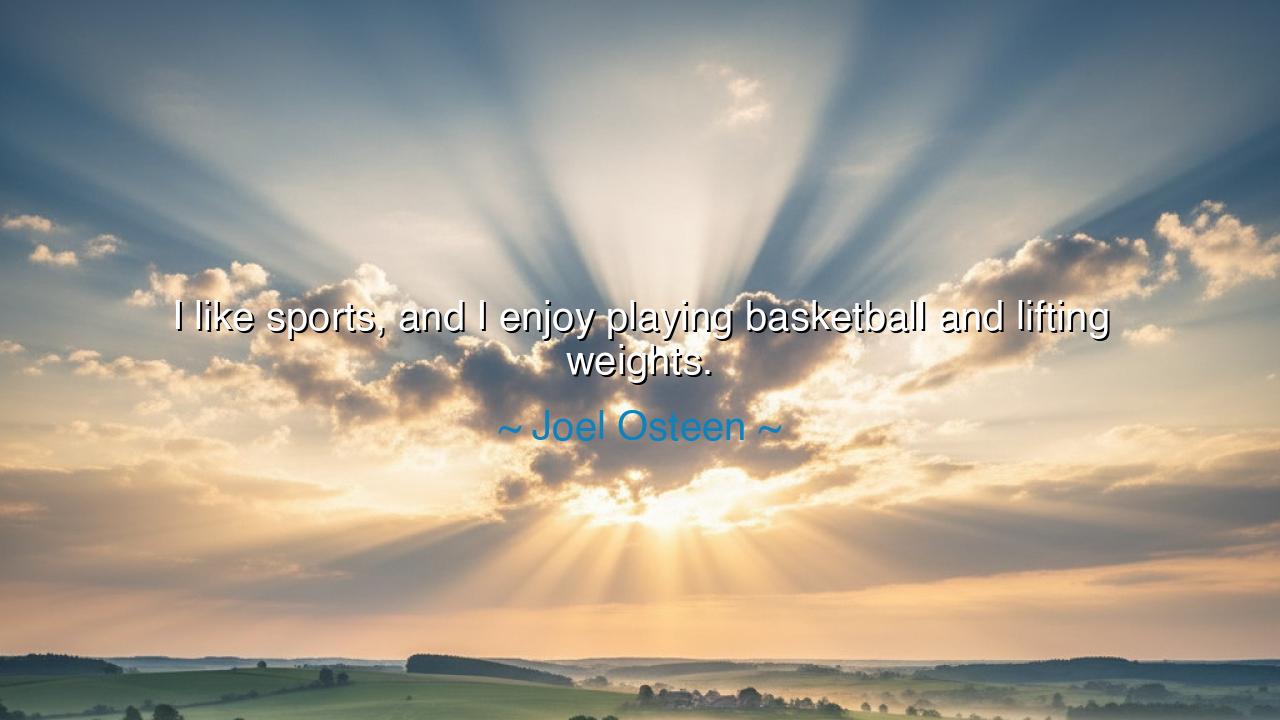
I like sports, and I enjoy playing basketball and lifting






When Joel Osteen proclaimed, “I like sports, and I enjoy playing basketball and lifting weights,” his words at first seem simple, yet beneath them lies a profound truth: that the body, like the spirit, must be trained, challenged, and strengthened. For to delight in sports is not only to seek leisure or amusement, but to embrace the discipline, the fellowship, and the vitality that physical striving gives to the human soul.
The ancients knew this well. The Greeks built their great gymnasiums not only to fashion stronger warriors, but to cultivate harmony between body and mind. To them, a sharp mind without a strong body was unbalanced, just as a strong body without wisdom was dangerous. In Osteen’s enjoyment of basketball and the lifting of weights, we glimpse the continuation of this ancient harmony: the joy of movement combined with the shaping of endurance, the laughter of play joined with the forging of strength.
To speak of basketball is to speak of unity and rivalry together. It is a contest that demands both individual skill and selfless teamwork. No one player can win alone; victory comes from passes, from trust, from the weaving together of many into one. To speak of lifting weights is to speak of personal battle—the struggle of one’s body against gravity, resistance, and fatigue. One is communal, the other solitary; one trains the heart in cooperation, the other trains the will in perseverance. Osteen’s love of both reveals the wisdom of balance, of finding strength in solitude and joy in fellowship.
History gives us the example of Milo of Croton, the ancient wrestler who trained by carrying a calf upon his shoulders each day. As the calf grew into a bull, Milo’s strength grew as well. This tale, though centuries old, reflects the same lesson as lifting weights: that persistence, daily discipline, and the willingness to embrace struggle forge power over time. Just as Milo bore his bull, so must each of us take up the weights of our own lives, knowing that the strain today becomes strength tomorrow.
But Osteen’s words also remind us that training and play need not be grim or joyless. He does not say merely, “I must do these things,” but rather, “I enjoy” them. This joy is vital. For discipline without joy becomes drudgery, and play without discipline becomes waste. True growth comes when the heart delights in the challenge, when sweat becomes a song, and when the game becomes not just competition, but celebration of life itself.
The lesson, then, is this: embrace the training of both body and spirit, not as burden, but as joy. Do not separate strength from gladness, nor effort from delight. Whether you play upon the court or labor in solitude, let your heart find pleasure in the movement, in the progress, in the shared laughter or the silent victory over self.
Practically, this means finding a practice of physical challenge that brings you joy—be it running, swimming, lifting, or playing a game with others. It means seeking not only to strengthen the body, but to awaken the spirit within it. It is better to play with delight than to toil with resentment, for joy sustains the effort far longer than duty alone. And just as in sport, so in life: find both the fellowship of the team and the solitude of personal struggle, and let both make you whole.
Thus, Joel Osteen’s simple confession becomes a timeless teaching: love the sport, enjoy the struggle, embrace the strength and the fellowship alike. For in these lies not only health of body, but harmony of life. And in that harmony, the human soul draws nearer to the fullness it was always meant to know.






AAdministratorAdministrator
Welcome, honored guests. Please leave a comment, we will respond soon